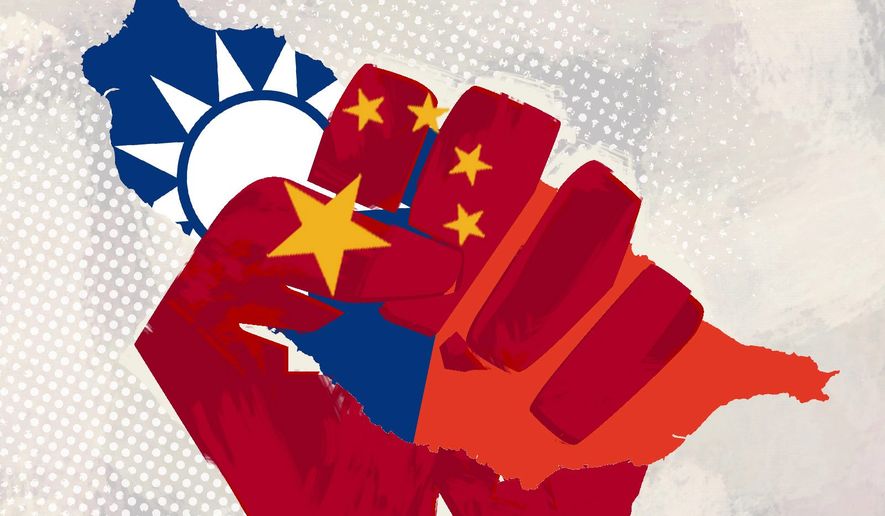OPINION:
Communist China has been threatening for years to regain control of Taiwan by any means necessary. For some time, the Communists ruling the Chines mainland believed this might be accomplished without resort to military force, but they have been more aggressive since the ascendancy of Xi Jinping in 2012.
Two factors necessitated the earlier strategy. The first is that until very recently, Beijing knew that using force against Taiwan would inevitably lead to a military confrontation and perhaps even war with the United States.
Second, it was not clear that an invasion would work or that if it did, it could prove incredibly costly. They had tried this in the closing days of China’s civil war when Chinese Nationalist forces decamped to the island. The Red Army tried to follow but lost thousands of troops on the beaches of Quemoy, the tiny island that Mao saw as a steppingstone to Taiwan herself. An armistice was negotiated between the two sides shortly thereafter, but the two sides have never reconciled.
Thanks to US support, Taiwan has maintained its independence and developed into a free, democratic, and prosperous home for more than 23 million Chinese who have no desire to be “reunited” with their Communist brothers and sisters on the mainland. Although trade is robust and more than a million passengers flyback or forth each year, any hope that Beijing might agree to tolerate a semblance of freedom following a “reunion” was quashed by the recent Communist crackdown on Hong Kong.
Beijing is no longer as convinced that the United States will risk war to protect Taiwan, and doubt that even if the United States wants to it couldn’t muster the resources quickly enough to stop the modern invasion force mainland China has at its disposal today. Even as the Biden Administration officials continue to assure the Taiwanese that we have their back and continue to sell the island defensive weapons, many diplomats worldwide and even within US military circles wonder if the United States is doing enough to persuade Beijing of the seriousness of our commitment to a trusted and reliable ally.
The symbolic and real-world consequences of abandoning Taiwan cannot be overestimated. The island nation is a true outpost of democracy in the Pacific and one of the very few nations in history to develop on its own into a vibrant democracy. As such, it has served as a beacon to Chinese everywhere and an alternative to the vision of Beijing’s Communist rulers. As such, Taiwan’s mere existence just off the coast of the mainland must be particularly grating to Beijing.
After President Carter withdrew US recognition from Taipei and bestowed it on the mainland capital, I vividly remember a report from a DC Chinese eatery. Everyone was used to “Peking,” but there were differences of opinion at the time about how to spell “Beijing.” A diner asked his waiter how he would spell the name of the Chinese capital. The waiter replied without hesitation, “T-A-I-P-E-I.”
In a strategic sense, Taiwan, as an incredibly well-placed reliable ally, is crucial unless the U.S. wants to accept ceding control of the sea lanes and the entire western Pacific region to Beijing. Failing to stand by Taipei after decades of assurances that we have her back would let other nations in the region know that they are on their own against an aggressive, well-armed, wealthy, and growing Chinese empire. Japan, South Korea, Vietnam, and India would get the message and begin kowtowing to the emerging hegemon.
America’s reliance on the production of the free nations of the region is significant; two companies in Taiwan account for half of the world’s microchip supply, as the pandemic-induced shortage of semiconductor computer chips showed. Taiwan is the world’s leading producer of electronic components essential to everything from automobiles, cell phones, and weapons systems. The US is scrambling to develop the ability to manufacture our own, but replacing current suppliers is easier wished for than done.
Taiwan’s largest chip manufacturer, TSMC, has announced plans to build a twelve-billion-dollar facility in Arizona. Still, it will take years for anyone to catch up with facilities in Taiwan itself which, along with Samsung in South Korea, is the only place capable of producing the most advanced chips today.
Beijing would obviously love to get her hands on Taiwan’s industrial capacity and scientific/technological expertise of a nation she wants to incorporate into her growing empire. Allowing that to happen would prove disastrous to the world economy. As one expert told Bloomberg News recently, even a failed attempt to take Taiwan by force would do major damage to the world economy.
We cannot afford to let that happen any more than we can afford to abandon the 23 million people of Taiwan to the tender mercies of Xi Jinping and his friends in Beijing.
• David A. Keene is an editor at large for the Washington Times.




Please read our comment policy before commenting.